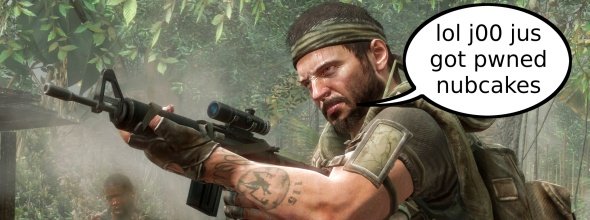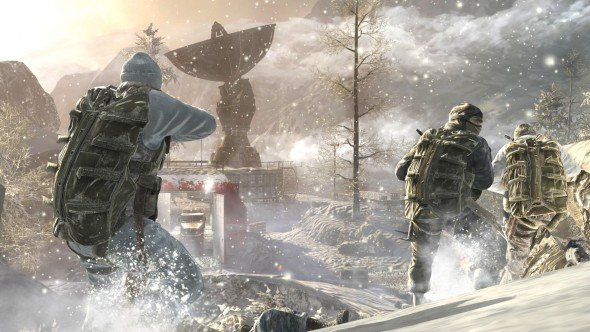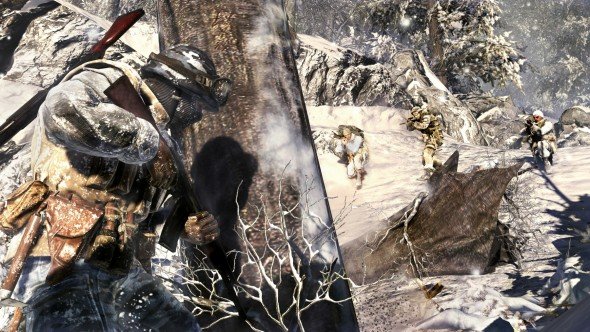Interview: CoD's military advisor versus 12-year-old boys

During this year's Gamescom, I took a moment to sit down with Hank Keirsey, the military advisor to the Call of Duty series. "I'd offer you some whiskey, but it turns out they don't have any," was the first thing he said. After that, he talked about the ethical issues and educational benefit of the Call of Duty series, how going to war hurts your gaming skills, what he'd like to do to the twelve-year-old kids who defeat him online, and what he thinks of Activision's firing of Infinity Ward's bosses.

PC Gamer: How did you get involved with the Call of Duty series?
Hank Keirsey: It was absolutely serendipitious, or a quirk of fate. With the first Call of Duty game, they said Dale Dye was an advisor for something. We need a guy. And of course, in the way that videogamers do, they immediately looked around the room and saw a TV broadcast that had a military guy on it. And said, "He's military, call him up." He happened to be a buddy of mine. So they grabbed John Hillen , and John Hillen knew he was the white collar knowledge guy, and knew all about strategy, tactics, operations. He knew I was a blue collar guy; knew guns, bullets, uniforms, kits, squad tactics. He brought me along. And later on he got offered something else, and went away, so I was left. I originally said, "I don't want to go out there, work on this. I'm really not a fan of videogames." He said, "No, let's go look." And then I saw the level of passion they were putting into these World War 2 games. [They were] teaching something about World War 2 - and I'm an old history guy. So I started there, and went to Modern Warfare. I said, "Well, they're teaching something about modern combat, that'll be good." Now they're going back to history, so I'm kind of excited about that. Now, we're not doing the Vietnam war, but we're doing a unit that was doing Special Operations in that era and in and around Vietnam as a backdrop. But still, an intellectually curious gamer out there will go, "Maybe I'll pick up a book about Vietnam, because there are many parallels about that conflict that can be drawn with some other current unpleasantness we're doing."
PC Gamer: You mentioned that you hoped that these games would be educational. You don't have any qualms about the ethics of turning war into entertainment?
Hank Keirsey: I always get asked that question. You know, "Don't you think that it's horrifying that the sacrifices of that generation, of Brits and Americans, Russians, has been minimalised and trivialised in this stinkin' game?" Holy shit! There's a whole generation of kids, young adults, that knew nothing about World War 2 until we put these games out. I've had them come to me. And I tell the same thing to the World War 2 veterans: you gotta tell your story. "Oh, I don't like videogames." I say, I know you don't. I don't expect you to. But nobody will ever know about you climbing up Point du Hoc and what the 2nd Ranger Batallion did and the legacy of courage and sacrifice, if you don't tell your story. Cause you're gonna die in 5 years. I don't tell them that of course. But they are, they're all dying. So by putting out these World War 2 games, I've had several young men come up to me and say, "I read this book now. I called my grandfather and found out what he did, and this summer I'm going to the Normandy battlefield, this summer vacation I had my dad take me out there." Kid had no interest in the event at all. That's important to me. Now, this is not a quest by the gamers to have a useful, enlightening experience; they've done this indirectly. By putting games, making them realistic and trying to piece together the actual scenarios, it has been a side benefit of what they've done. Make no mistake about it, they're trying to make a game that everybody wants to play. And sell well, and make the best possible game. I've been with these guys and seen 'em. They don't care about the money as much as they do about, "I want to be recognised for the best possible graphics, the best audio, I want to be the best at my game." Money is nice, and no one is going to argue with it when they start pressing the damn bonus checks. "No no, take it back, give it to the kids in Ghana who have cleft palates." No, they take the money, they'll drive a BMW around, really they have a passion for doing this thing right. As all craftsman have throughout the years, to make the best possible product.

PC Gamer: Have you played the game yourself?
Hank Keirsey: The only game I play is Call of Duty. I've played them all. This one I've played a couple levels of, but I haven't been through the whole game yet. But I've been very impressed. Every time they use that engine, they get better and better at making things. You've seen the demo; it's pretty impressive.
The biggest gaming news, reviews and hardware deals
Keep up to date with the most important stories and the best deals, as picked by the PC Gamer team.
PC Gamer: When you play it, do you play it for the entertainment, or is it curiosity about how they're representing these wars?
Hank Keirsey: I'd say it's both reasons. The most powerful impact any of these games have had on me is the original one, because I didn't play videogames. Since PacMan, way back when, and eschewed them as a product. PT, go split some wood, go do something else real, play some sports. So when I got this game and had to play it, I thought it was amazing how, as a soldier, you're taking fire, you're not doing your personal drills and changing your magazine before you go round the corner, you get whacked. And it irritated me, because that's what I do for a living, that I couldn't whip the singleplayer version. I kept getting whacked going across the field. Or in multiplayer, had a twelve-year-old that was dominating me. It irrated me. [laughs] So I went at it. I'll be damned if I let that twelve-year-old have his way with me. You know, you stayed at it till you were able to dominate the field, like all real Brits and Americans do.

PC Gamer: So are you much better at the games now?
Hank Keirsey: I was. And then I went to Iraq for a year and haven't played for a bit. Meanwhile that twelve-year-old has spent eight hours a day while I was gone in Iraq. I can't touch him. I got into a game with a base of guys with equally as un-nimble hands as I have, and I think I could dominate them just with use of double-A fire, cover, supporting fire. If nothing else, I think I could slither down into his basement where he's working on his man-cave and I could take him out. Yeah. Use some geo-location device on the Xbox to figure out where he is.
PC Gamer: Are you familiar with the Infinity Ward situation?
Hank Keirsey: I'm familiar with it. They gave me a sit-rep in Iraq. "You won't believe this, Vince and Jason are fired." Devastating. That was a great little studio. Had great leadership element there, they combined creative energy with the discipline and drive in the process. I love those guys, so I was very sad to see them go. I understand how it happened, I think. Nobody has told me the story, but they're very bullheaded. You know, "We're doing it our way or the highway," and so someone said, "There's the highway," I think. It's sad. Are we going to rebuild? Hell yeah. The unit takes casualties. If you can put them back together, get the morale up, you can take the hill. Either that or you deconstitute the outfit and bring in a new outfit. Right? We have a mission - make the best game possible - at Activision. We're going to take the hill, Graham.

